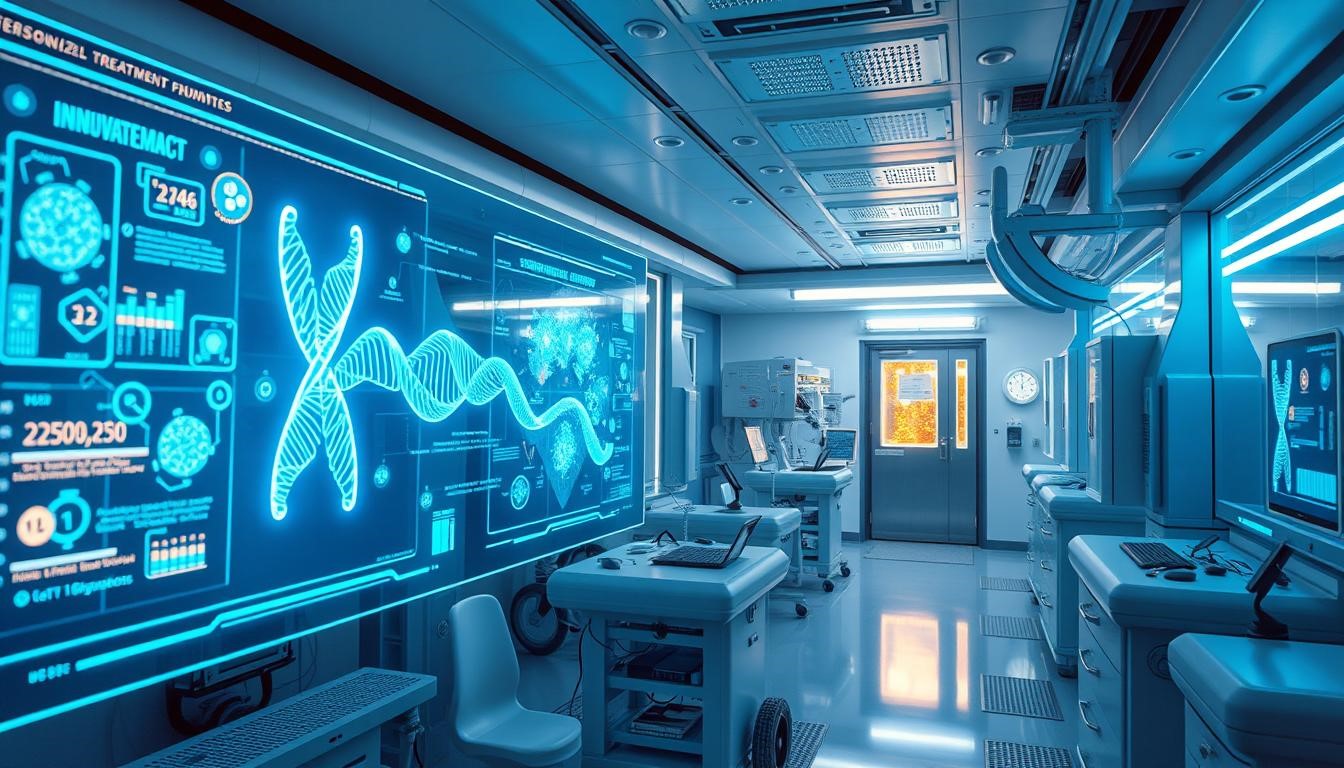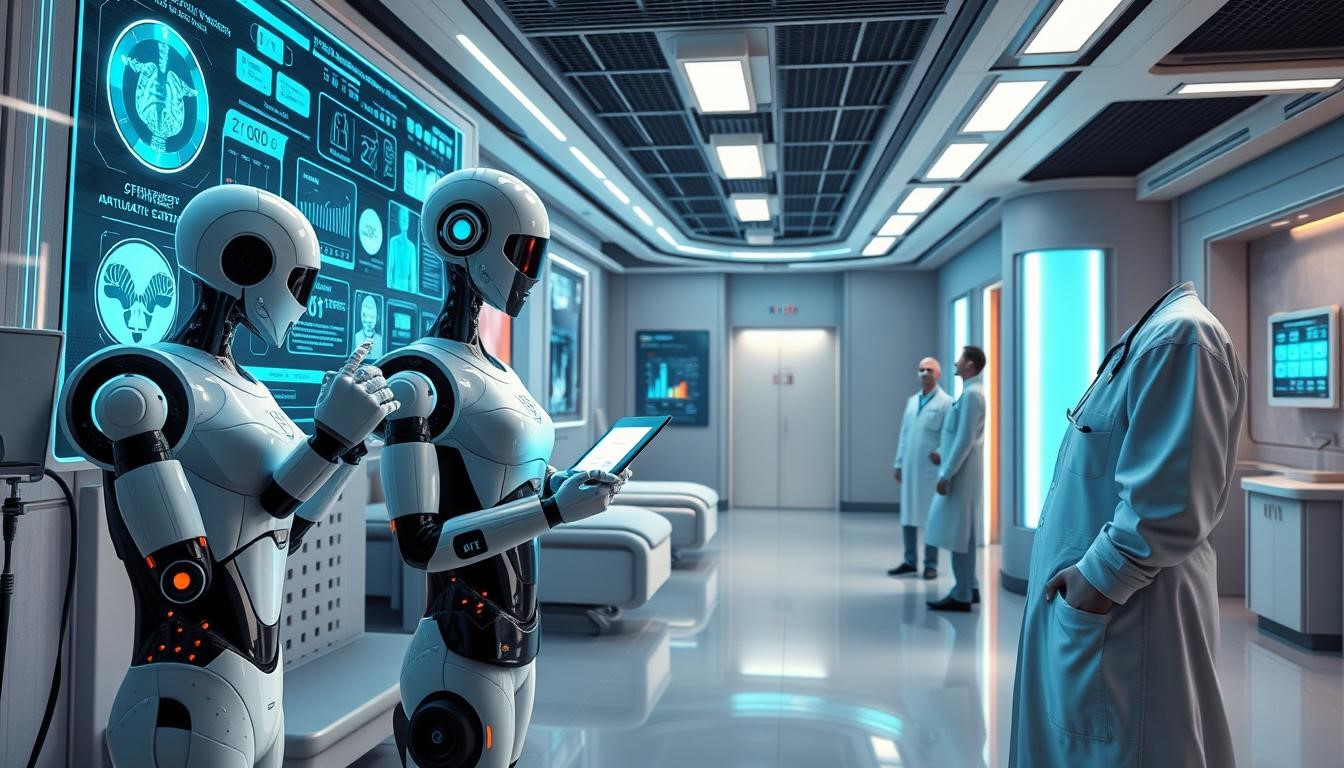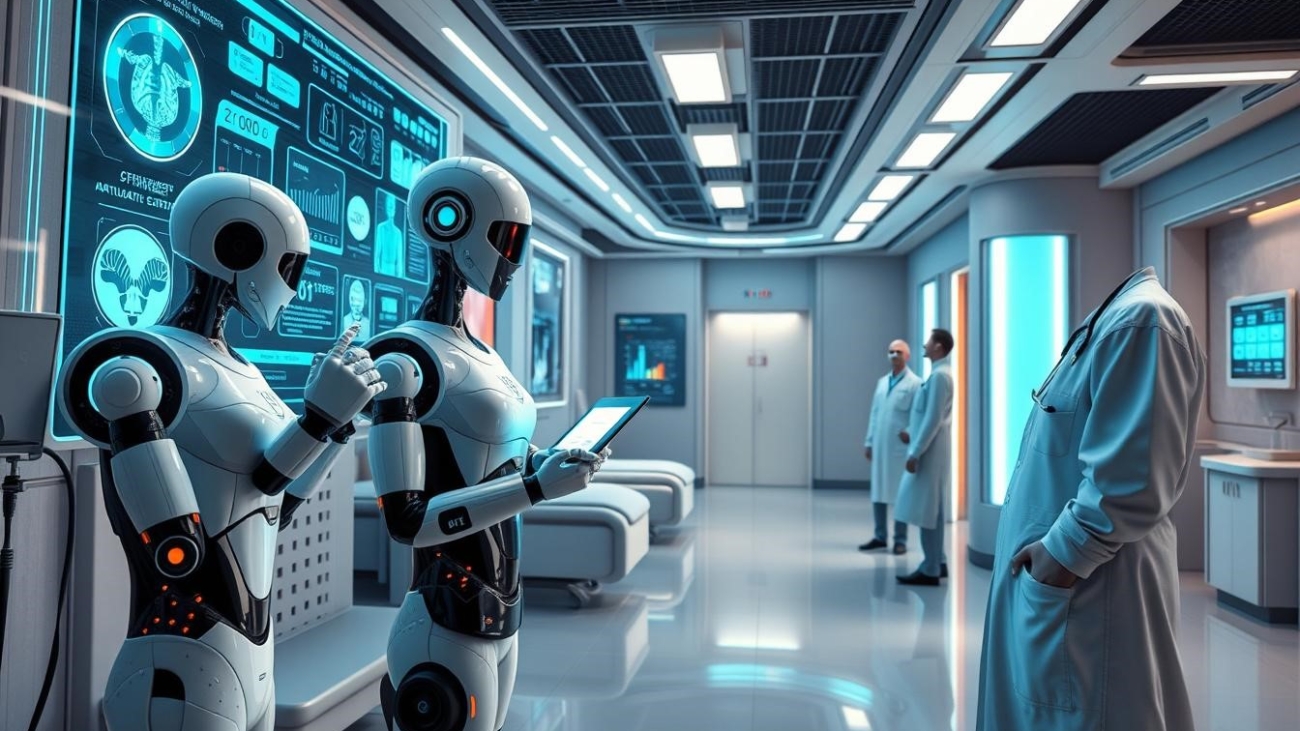Artificial Intelligence is changing healthcare, especially in Cancer Treatment. It looks at lots of medical data, finds patterns, and predicts outcomes. This tech makes personalized medicine possible, leading to better patient care and future treatments.
Now, doctors can make more precise diagnoses and create tailored treatment plans thanks to AI. AI in Cancer Treatment has also opened new doors for research and development. This leads to better care and results for patients. As AI grows, it will play a bigger role in Personalized Cancer Treatment. This means doctors can give patients more effective and personalized care.

Understanding AI’s Revolution in Healthcare
Artificial intelligence is changing healthcare in big ways. It’s making patient care better and making clinical work easier. At the core of this change is Healthcare Technology. It helps analyze lots of medical data, leading to better diagnoses and treatment plans.
Machine Learning, a part of AI, is key in this change. It helps doctors find patterns and insights that humans might miss.
Machine Learning has many uses in healthcare. It helps with medical image analysis and predicting patient outcomes. This technology lets healthcare providers give better care, improving patient lives.
As Healthcare Technology grows, we’ll see more AI in healthcare. This could lead to even more innovative uses of AI in healthcare.
- Medical imaging analysis, where Machine Learning algorithms can help detect abnormalities and diagnose conditions more accurately
- Patient data analysis, where Healthcare Technology can help identify high-risk patients and predict patient outcomes
- Clinical decision support, where AI can provide healthcare professionals with real-time guidance and recommendations
The healthcare industry is embracing AI and Healthcare Technology. We’ll see big improvements in patient care and outcomes. Machine Learning and AI will help healthcare providers give more personalized and effective care. This will change healthcare for the better.

Personalized Cancer Treatment: A New Era
Personalized medicine is changing how we fight cancer. It lets doctors make treatment plans just for each patient. This new way has already improved how well patients do and how long they live.
Old ways of treating cancer are being left behind. Now, doctors use AI to look at lots of data. This helps them find the best treatment for each person.
Key Benefits of Personalized Medicine
- Improved treatment outcomes and survival rates
- Increased patient satisfaction and quality of life
- Reduced risk of adverse reactions and side effects
- More accurate diagnosis and staging of cancer
As we learn more, personalized medicine will keep getting better. AI and machine learning will help doctors make smarter choices. This means patients will get the best care possible.
AI-Powered Cancer Treatment Methods
AI is changing how we treat cancer. It helps doctors create treatments that fit each patient’s needs. For instance, AI can make radiation therapy and chemotherapy work better and with fewer side effects.
Some AI-powered cancer treatments include:
- Immunotherapy, which uses the body’s immune system to fight cancer
- Targeted therapy, which uses drugs that specifically target cancer cells while minimizing damage to healthy cells
- Personalized medicine, which uses genetic information to develop customized treatment plans
These new treatments are thanks to AI in Healthcare. It lets doctors analyze lots of data for better diagnoses.
As research keeps moving forward, we’ll see more AI treatments for cancer. AI will help doctors give patients care that’s both effective and tailored to them. This will lead to better health outcomes and a higher quality of life.
Transforming Patient Diagnosis and Monitoring
Patient care is at the forefront of medical innovations, with AI playing a big role. AI helps doctors analyze lots of data, like medical images and patient histories. This helps find cancer cases early and accurately.
This method leads to early detection and screening. It allows for timely interventions, improving treatment results. AI systems can also predict how well treatments will work. This helps doctors adjust plans as needed.
AI is also changing how we monitor patients. It lets healthcare providers track patient progress and make informed decisions. This is a big step forward in patient care.

Key Benefits of AI in Patient Diagnosis
- Enhanced accuracy in cancer detection
- Personalized treatment plans based on patient data
- Improved patient outcomes through timely interventions
AI is also used in chatbots and virtual assistants to support patient care. These tools give patients reliable information and guidance. By using AI in diagnosis and monitoring, healthcare providers can offer better care. This leads to better health outcomes for patients.
Challenges and Ethical Considerations
AI is changing healthcare, but it brings up big questions. Using AI in cancer treatment makes us think about data privacy, AI bias, and how clear AI decisions are. These issues are complex and need careful thought and solutions.
Some main problems with AI in healthcare are:
- Data privacy and security: keeping patient data safe
- Bias in AI algorithms: fixing AI’s potential biases
- Transparency and accountability: explaining AI’s decisions clearly
To tackle these challenges, we need good rules and guidelines. We must set clear AI standards and train healthcare workers. By focusing on ethics and solving these problems, AI can help in cancer treatment. This will lead to better patient care and more lives saved.
Conclusion: The Future of AI in Cancer Care
AI is changing healthcare, especially in cancer care. It’s making big steps in early detection, personalized treatments, and keeping an eye on patients. AI can look through lots of data to find patterns and predict how treatments will work.
This is just the start of how AI will change cancer care. It will make diagnosing cancer faster and more accurate. It will also help patients get better care and make healthcare systems work better.
AI is getting better at finding cancer early and watching patients closely. This means doctors and patients will have more hope. But, we need to make sure AI is used safely and ethically. With hard work and a focus on patients, AI could make a big difference in fighting cancer.
FAQ
What is the role of AI in personalized cancer treatment?
Artificial Intelligence (AI) is changing healthcare, especially in cancer treatment. It helps tailor treatment plans to each patient. This is based on their unique characteristics, genetic makeup, and medical history. This approach leads to more effective and personalized cancer care.
How is AI transforming patient diagnosis and monitoring in cancer care?
AI is crucial in early detection and screening. It uses machine learning to analyze images and data. This helps spot cancer cases more accurately.
AI also predicts how well treatments will work. It’s used in systems that monitor patients in real-time. This lets doctors adjust treatment plans as needed.
What are the key AI-powered cancer treatment methods?
AI is improving treatments like radiation and chemotherapy. It’s also helping create new treatments, like immunotherapy. This targets cancer cells without harming healthy ones.
What are the challenges and ethical considerations associated with the use of AI in cancer treatment?
Big challenges include keeping patient data private and avoiding AI bias. It’s also important for AI decisions to be clear. There are ethical worries about relying on AI for health decisions and job losses in healthcare.
How is AI expected to shape the future of cancer care?
AI will keep changing cancer care, from diagnosis to treatment and follow-up. It could lead to better patient outcomes and more efficient healthcare. More research in AI for medicine is needed to unlock its full potential in cancer treatment.


Add a Comment